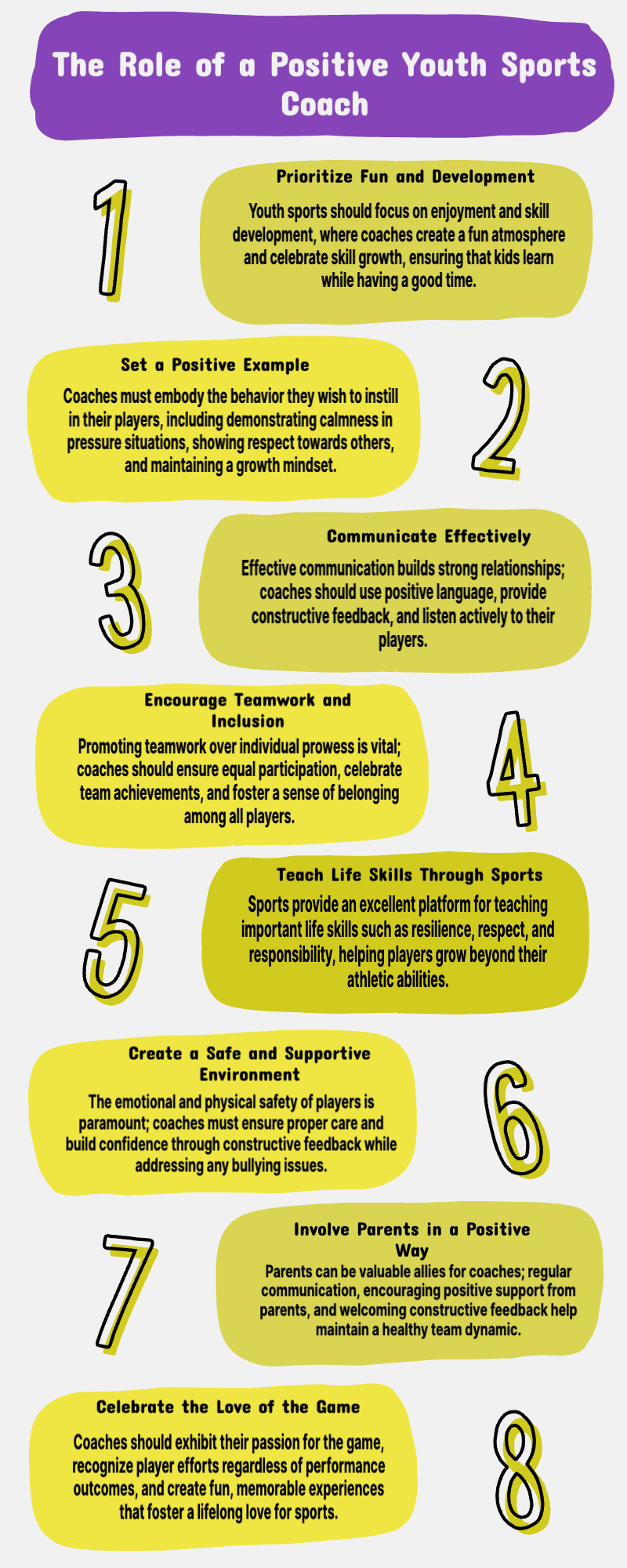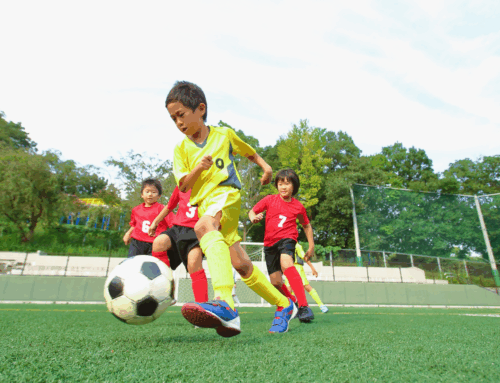Get our exclusive report. Download the iSport360 Club Switching Report Here – For Club Admins, Rec Leaders and Coaches.
How to Be a Positive Youth Sports Coach
Youth sports are about more than just winning games—they’re an opportunity to teach kids life skills, build confidence, and foster a love for physical activity. As a coach, you play a pivotal role in shaping young athletes’ experiences and attitudes toward sports. Here are some practical ways to be a positive youth sports coach and make a lasting impact on your team.

1. Prioritize Fun and Development
The primary goal of youth sports is to help kids enjoy the game while learning new skills.
- Create an Enjoyable Atmosphere: Incorporate games, challenges, and light-hearted moments into practice.
- Focus on Skill Growth: Celebrate small victories, such as mastering a new technique or improving teamwork.
2. Set a Positive Example
Kids look up to their coaches, so it’s essential to model the behavior you want to see.
- Stay Calm Under Pressure: Demonstrate sportsmanship, even in tough situations.
- Be Respectful: Treat referees, opposing teams, and parents with respect.
- Maintain a Growth Mindset: Show kids that mistakes are opportunities to learn.
3. Communicate Effectively
Good communication is the foundation of a strong coach-player relationship.
- Use Positive Language: Encourage rather than criticize. Replace “Don’t mess up!” with “You’ve got this!”
- Be Clear and Constructive: Give specific feedback that helps players improve.
- Listen Actively: Make time to hear your players’ thoughts, concerns, and ideas.
4. Encourage Teamwork and Inclusion
Help players understand that success is about working together, not individual glory.
- Promote Equal Participation: Ensure every player gets a chance to contribute, regardless of skill level.
- Celebrate Team Achievements: Highlight how collaboration leads to success, both on and off the field.
- Build a Sense of Belonging: Foster an environment where every player feels valued and included.
5. Set Realistic Goals
Kids thrive when they’re working toward achievable objectives.
- Focus on Effort, Not Outcomes: Emphasize improvement over winning.
- Set Short-Term Goals: Break big objectives into smaller, manageable milestones.
- Celebrate Progress: Recognize individual and team achievements regularly.
6. Teach Life Skills Through Sports
Use sports as a platform to instill values that extend beyond the game.
- Resilience: Teach kids to bounce back from setbacks.
- Respect: Emphasize the importance of treating others with kindness and fairness.
- Responsibility: Encourage players to take ownership of their actions and commitments.
7. Create a Safe and Supportive Environment
Safety—both physical and emotional—is crucial in youth sports.
- Prioritize Player Well-Being: Ensure proper warm-ups, hydration, and equipment.
- Foster Confidence: Avoid harsh criticism; instead, build players up with constructive guidance.
- Address Bullying: Take immediate action to prevent or resolve conflicts among teammates.
8. Involve Parents in a Positive Way
Parents can be your greatest allies when approached thoughtfully.
- Communicate Regularly: Keep parents informed about schedules, goals, and expectations.
- Encourage Supportive Behavior: Ask parents to cheer positively and respect all players, coaches, and officials.
- Welcome Feedback: Be open to constructive input from parents while maintaining your authority as a coach.
9. Celebrate the Love of the Game
Your enthusiasm is contagious. Show your players that sports are about more than competition—they’re about passion, growth, and joy.
- Share Your Passion: Let your love for the game shine through in practices and games.
- Recognize Effort: Applaud players for their dedication and hard work, regardless of the scoreboard.
- Have Fun Together: End practices with a fun activity or team bonding moment to leave everyone smiling.
Wrap Up!
Being a positive youth sports coach means more than teaching skills or winning games—it’s about creating an environment where kids feel supported, motivated, and inspired. By focusing on development, communication, and life lessons, you can leave a lasting impact on your players and help them grow into confident, capable individuals.
What’s your favorite memory of a positive coaching moment? Share your stories in the comments!
iSport360 is the only app that does it all for youth sports. For more information on what we do, click here.
About the author:
Amy Masters is a sports mom, coach, and club administrator. She has been coaching youth sports for more than 10 years. She started Jr Lions Field Hockey, the youth recreation program for the Hunterdon County community growing it from 40 players in year 1 to 150 players by year 3. A few years later, she saw the love and competitiveness grow then started Omega Field Hockey Club serving NJ and PA players. Before coaching, she was a collegiate field hockey player for Lock Haven University. In her spare time (lol), she is head of marketing for iSport360 and the co-editor of the Youth Sports Survival Guide. The Youth Sports Survival Guide is the largest youth sports newsletter in the world.
Learn more or request a demo of our youth sports software that is helping teams improve communication, organization and player development.
January 8, 2025





